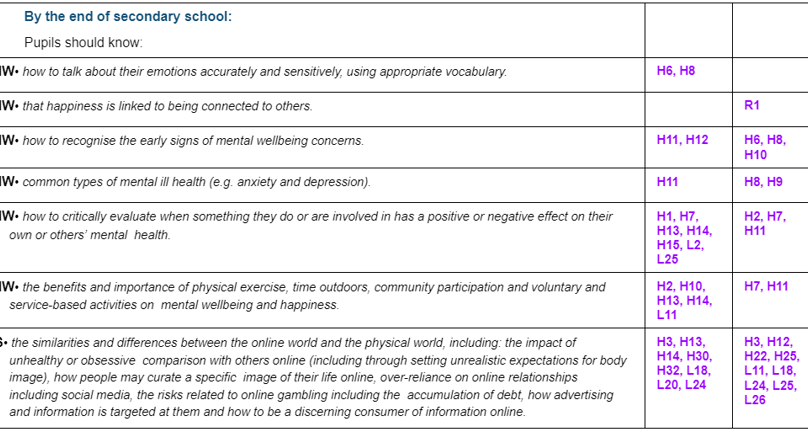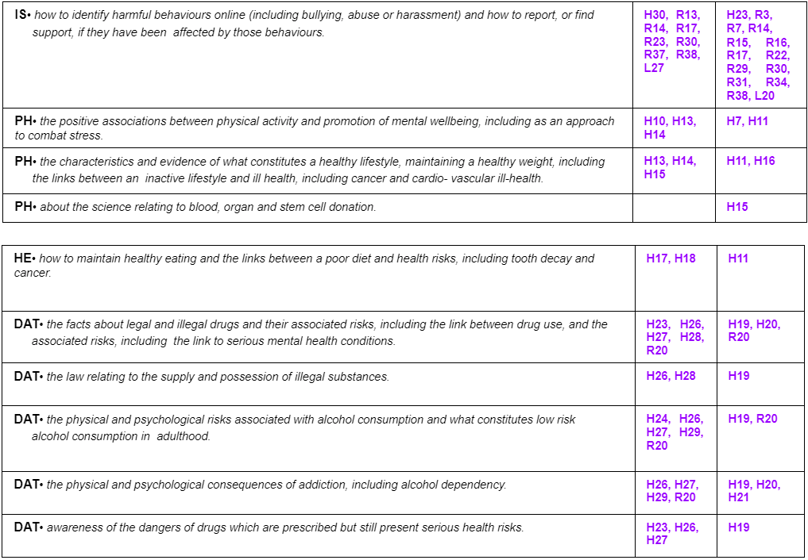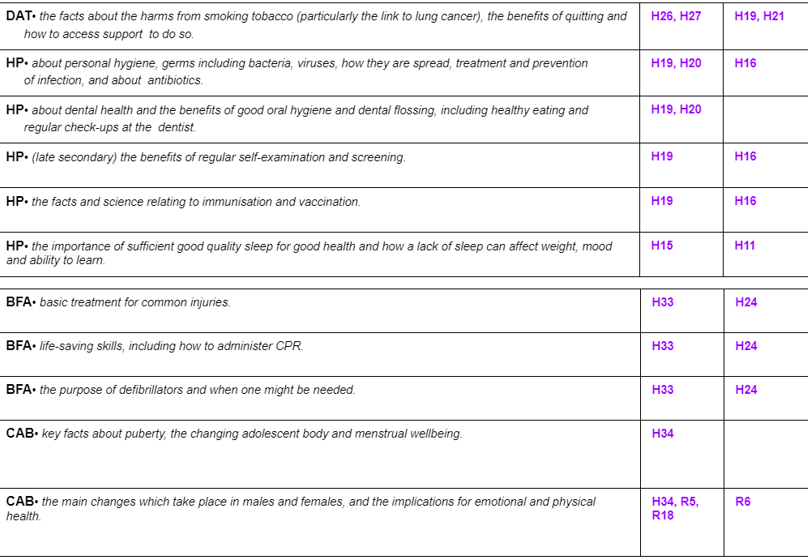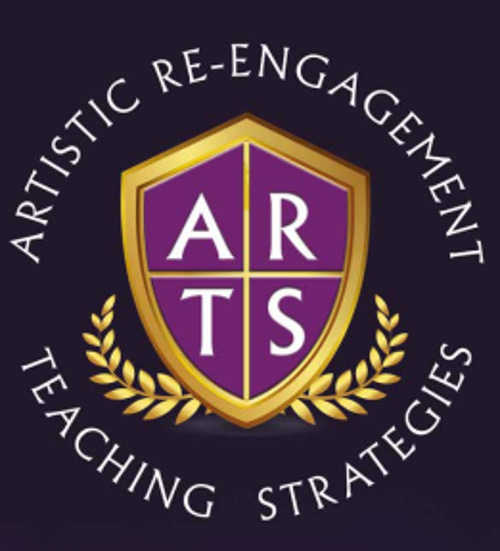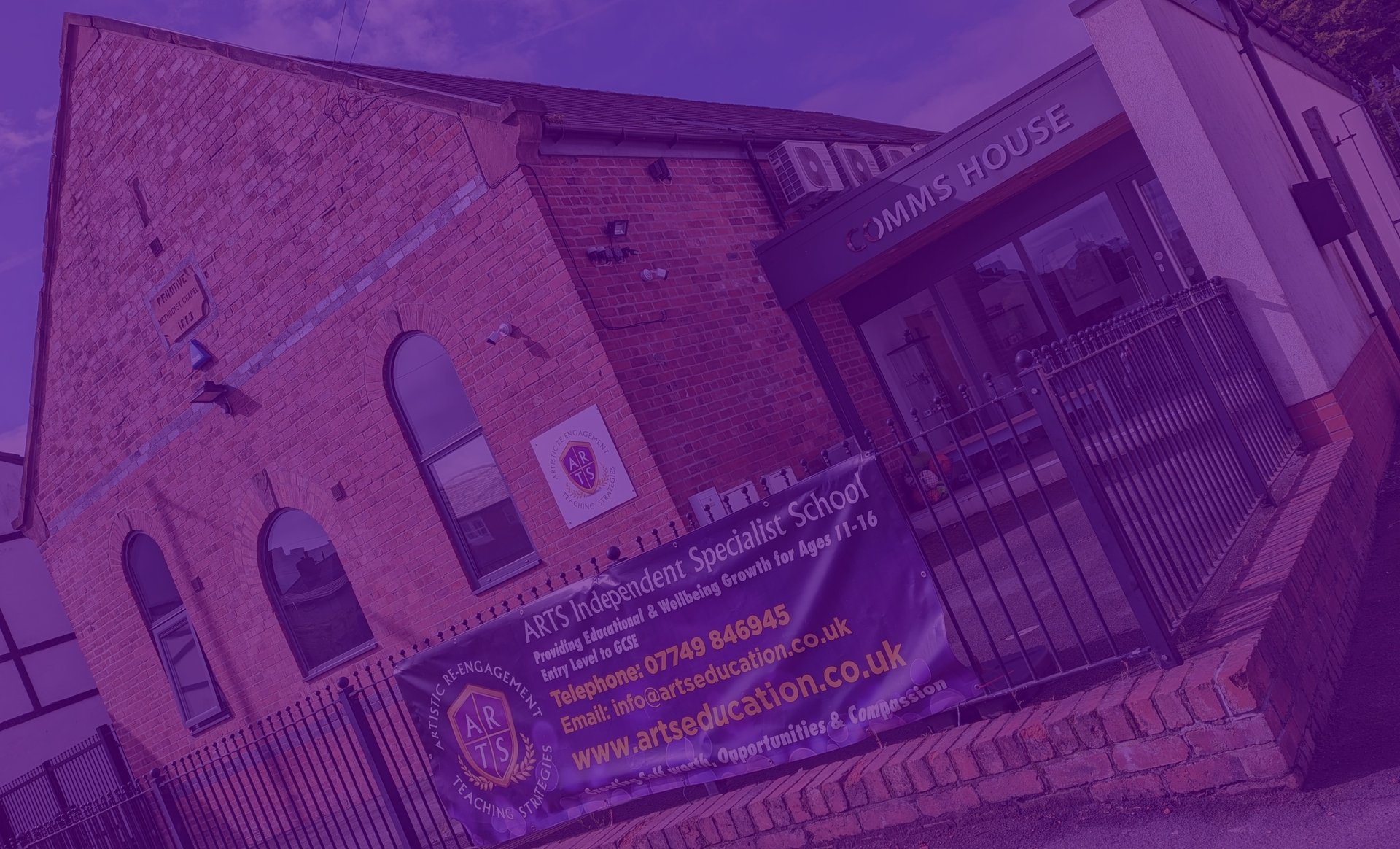
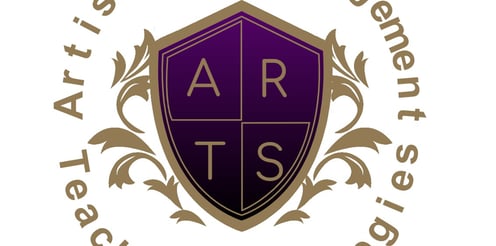

To Create: Self-worth, Opportunities & Compassion
PSHE EDUCATION KEY STAGES 3-5
Personal, Social, Health and Economic (PSHE) education is a school subject through which pupils develop the knowledge, skills and attributes they need to manage their lives, now and in the future. It helps children and young people to stay healthy and safe, while preparing them to make the most of life and work. PSHE education also helps pupils to achieve their academic potential.
The Department for Education published Statutory Guidance for Relationships Education, Relationships and Sex Education (RSE) and Health Education in June 2019. This sets out what schools must cover from September 2020 (though not all they should cover as part of broader PSHE education).
Our PSHE curriculum will cover economic wellbeing, careers and enterprise education, as well as education for personal safety, including assessing and managing risk.
Students will be encouraged to take part in break & lunchtime achievement
This Programme of Study sets out learning opportunities for key stage 1 to 5, based on three core themes:
CORE THEME 1: HEALTH AND WELLBEING
CORE THEME 2: RELATIONSHIPS
CORE THEME 3: LIVING IN THE WIDER WORLD
How we are covering the statutory Content
The statutory guidance is comprehensively covered by learning opportunities across all three core themes. Even though much of ‘Living in the wider world’ is not included in statutory requirements, the theme as a whole remains vitally important for pupils’ personal development and economic wellbeing, as well as in supporting schools to meet the Gatsby Benchmarks for careers education as part of the DFE Careers Strategy.
The final section of the Programme of Study sets out the content grids from the Statutory Guidance for Relationships Education, RSE and Health Education, mapped to the Programme of Study, clearly identifying the Programme of Study learning opportunities that address each bullet point from the statutory guidance.
We are committed to raising the standard of PSHE education. We break down learning by year group into half-term blocks, and look to offer a wide range of additional support and professional development opportunities.
Our PSHE curriculum looks to set out learning opportunities for each key stage, in each core theme, organised under subheadings. These learning opportunities should be used flexibly to plan lessons according to pupils’ development, readiness and needs, and taking into account prior learning, experience and understanding.
Learning from one area may be related and relevant to others. Whilst this framework distinguishes three separate core themes, there will be extensive overlap, so when planning teachers may draw from more than one theme. For example, Relationships and Sex Education (RSE) falls within both ‘Health and Wellbeing’ and ‘Relationships’, as sexual health should always be considered as an element of health education but also taught within the context of healthy relationships. Similarly, whilst they are specifically addressed where appropriate, assessing and managing risk and managing life online are integrated throughout all three core themes.
PSHE education addresses both pupils’ current experiences and preparation for their future. Our PSHE Curriculum provides a spiral curriculum to develop knowledge, skills and attributes, where prior learning is revisited, reinforced and extended year on year. This is grounded in the established evidence base for effective practice in PSHE education.
Our PSHE Curriculum identifies a broad range of important issues, ensuring that we reflect the universal needs of all children and young people, as well as the specific needs of the pupils in our school or community.
For the planning and ordering of topic areas for our pupils, it is important that we start with identifying their needs.
Examples of useful data sources for staff include Public Health England Child and Maternal Health (CHIMAT) data sets, the local authority’s joint strategic needs assessment (JSNA) and your own knowledge of your pupils’ needs. It is important that pupils recognise their PSHE education as relevant and applicable across many important areas of their lives.
Much of the specific knowledge taught in PSHE education changes regularly, for example as a result of legal changes, medical or technological advances. It is therefore important to ensure that all information used to develop pupils’ knowledge on any aspect of PSHE education is up to date, accurate, unbiased and balanced.
A note for staff about the learning opportunities
Many of the learning opportunities, particularly in key stages 3 and 4, refer to ‘managing’ or ‘responding to’ challenging situations. By these terms we mean a variety of strategies which, depending on the context, might include: being able to identify risks or warning signs; resisting internal or external pressures; making informed decisions; exit strategies for unsafe situations; and knowing whom, how and when to ask for help, including reporting concerns. The terms ‘managing’ and ‘responding to’ in learning opportunities, should not be interpreted as suggesting that children and young people are responsible for the risks they encounter. Therefore, whilst teachers should endeavour to equip pupils with the knowledge and skills to help keep themselves and others safe, language and activities should never imply that blame or responsibility rests with anyone who has experienced, or is at risk of experiencing, harm.
PSHE Planning framework for pupils with SEND
The Planning Framework is organised into six sections:


Assessment
Why it is important that learning in PSHE education is assessed:
Pupils need opportunities to reflect on their learning and its implications for their lives.
Teachers need to know that learning has taken place, be able to demonstrate progress and identify future learning needs.
Assessment increases pupils’ motivation and improves learning, as their raised awareness of their progress illustrates the value of this learning.
Assessment allows the leadership team, parents, governors and school inspectors to see PSHE education’s impact on pupils and whole school outcomes, such as Ofsted judgements on personal development, safeguarding, spiritual, moral, social and cultural (SMSC) development and the promotion of fundamental British values. Without assessment, all a school can do is describe its PSHE provision, not show its impact.
The DfE also states in the statutory guidance for Relationships, Sex and Health education that “schools should have the same high expectations of the quality of pupils’ work in these subjects as for other curriculum areas” — therefore assessment for and of learning should be central to any PSHE education provision.
PSHE at Key stage 3-4
At key stage 3, PSHE education acknowledges and addresses the changes that young people experience, beginning with transition to secondary school, the challenges of adolescence and their increasing independence. It teaches the knowledge and skills which will equip them for the opportunities and challenges of life. Students learn to manage diverse relationships, their online lives, and the increasing influence of peers and the media.
At key stage 4, students deepen knowledge and understanding, extend and rehearse skills, and further explore attitudes, values and attributes acquired during key stage 3. PSHE education reflects the fact that students are moving towards an independent role in adult life, taking on greater responsibility for themselves and others.
Relationships and Sex Education (RSE) falls within both ‘Health and Wellbeing’ and ‘Relationships’, as sexual health should always be considered as an element of health education but also taught within the context of healthy relationships.
CORE THEME 1: HEALTH AND WELLBEING
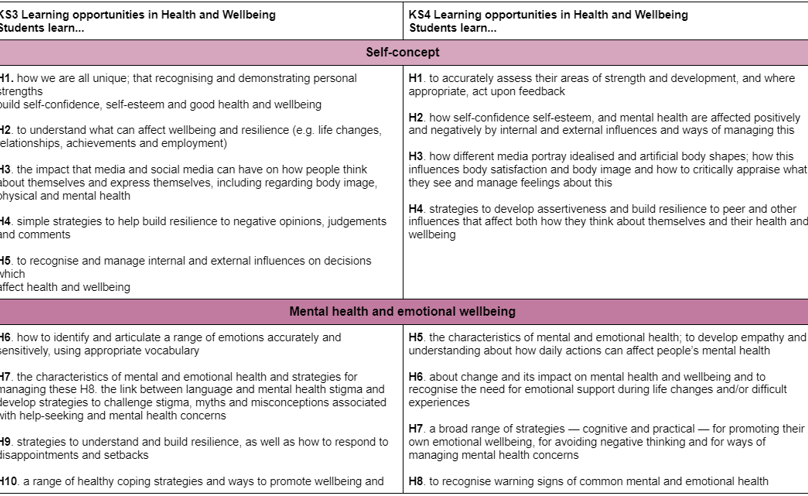

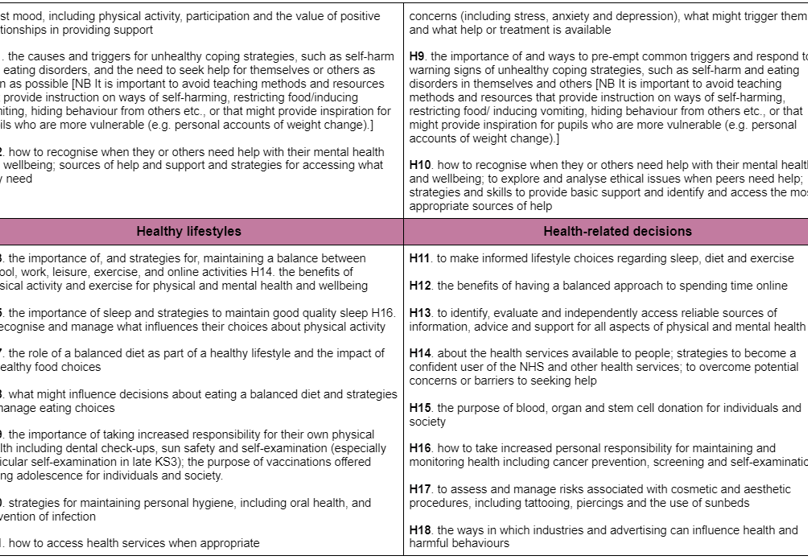

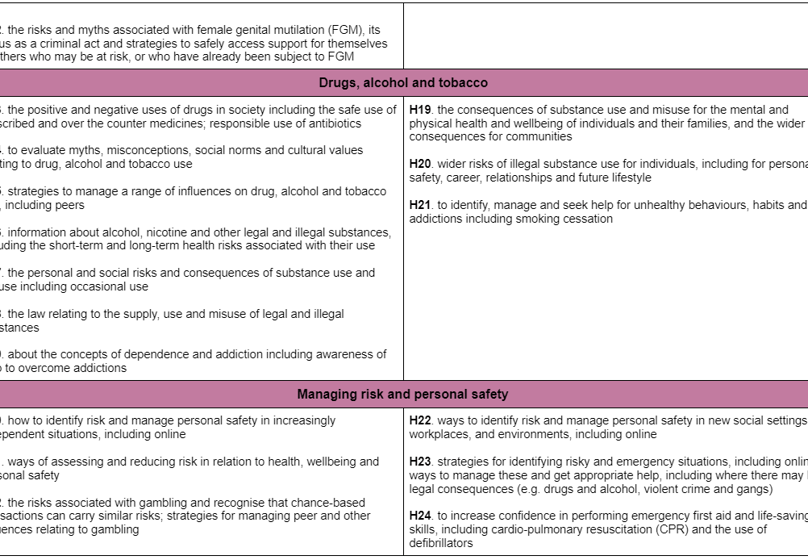

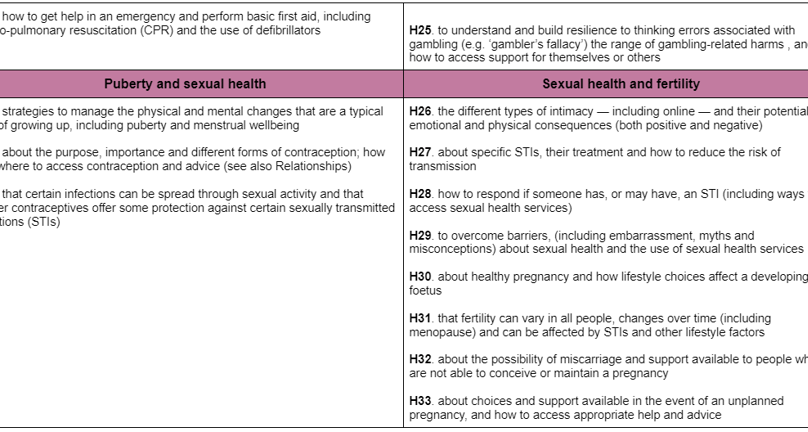

CORE THEME 2: RELATIONSHIPS
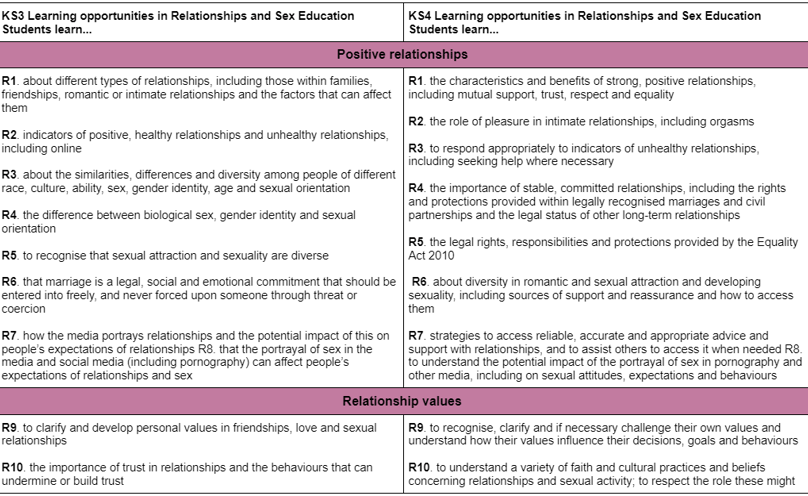

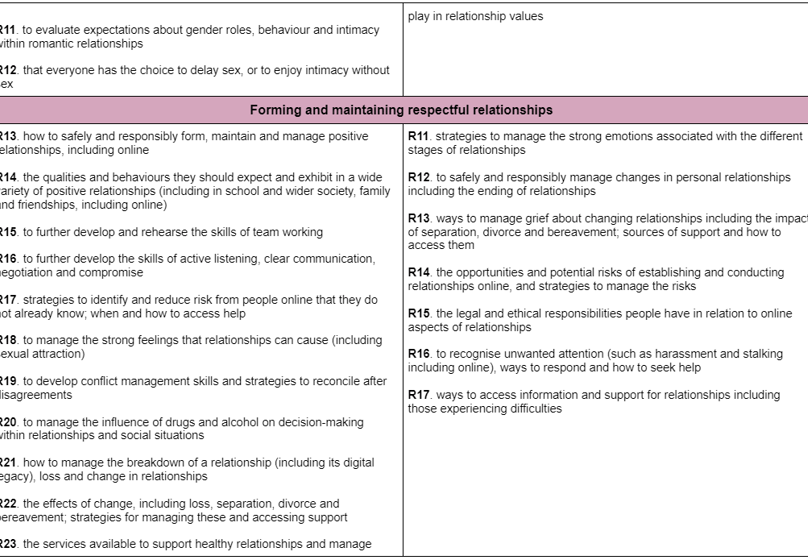

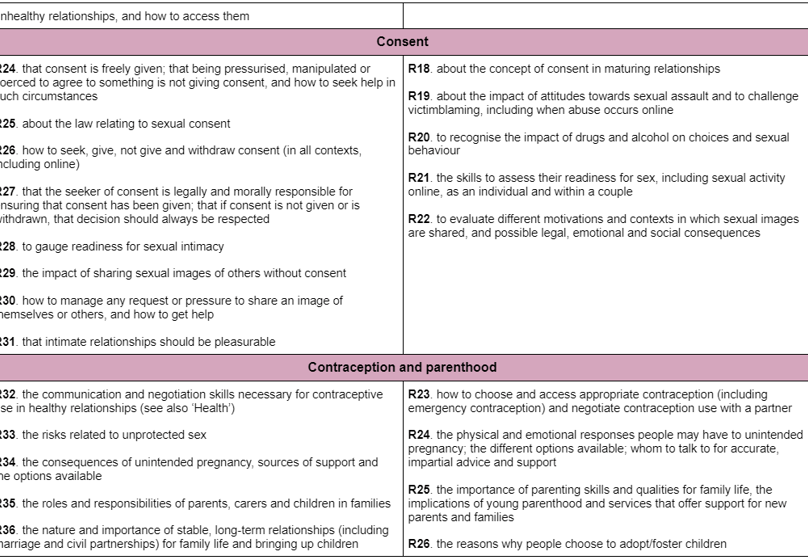

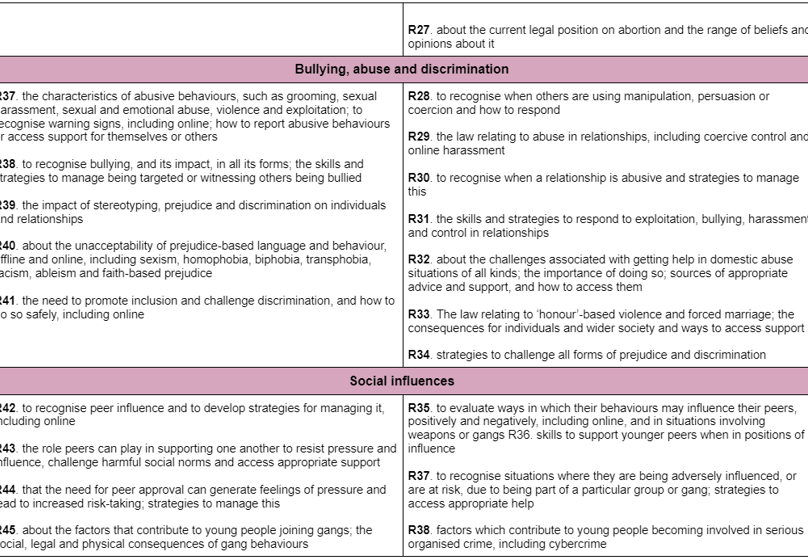


CORE THEME 3: LIVING IN THE WIDER WORLD
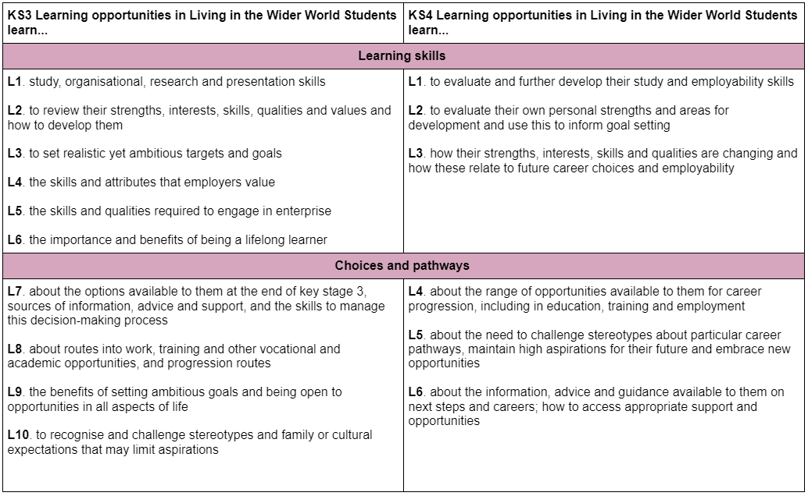

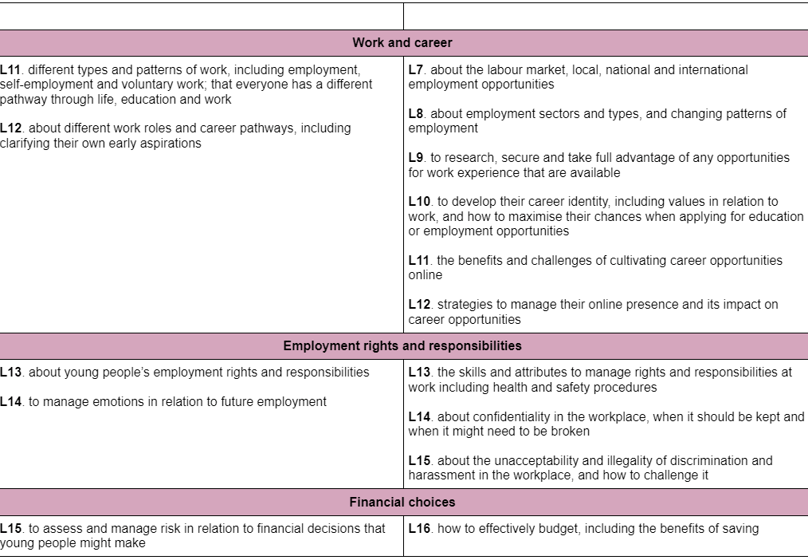

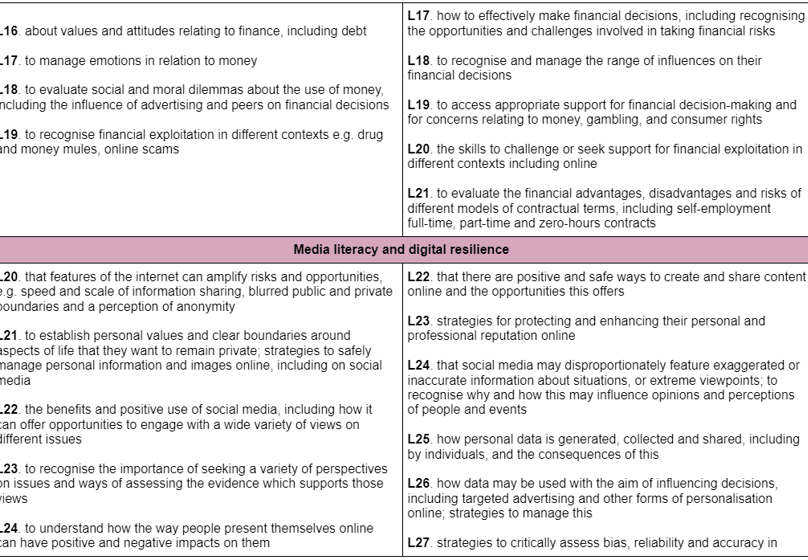



KEY STAGE 5
By the end of key stage 5 we need to be preparing students to manage their current lives and laying the foundations for managing future experiences. As students progress through the key stages, this balance shifts towards teaching related to young people’s current experiences. It is essential to provide a comprehensive PSHE education programme in key stage 5; this ensures students continue to learn about issues with real-life relevance to them, at a crucial transition point in their lives.
The learning opportunities at key stage 5 assume that students have already covered those in key stage 4. However, students entering key stage 5 from different feeder schools may bring a range of experience and understanding, so it may be appropriate to also draw on learning opportunities in key stage 4 when planning. It is important to revisit and reinforce earlier learning through learning that ‘connects’ it to contexts that are relevant to this age group, such as the workplace.
This key stage represents the last opportunity to ensure that students have the knowledge and understanding, skills, strategies and attributes they need for independent living and the next stage in their education or career.
CORE THEME 1: HEALTH AND WELLBEING
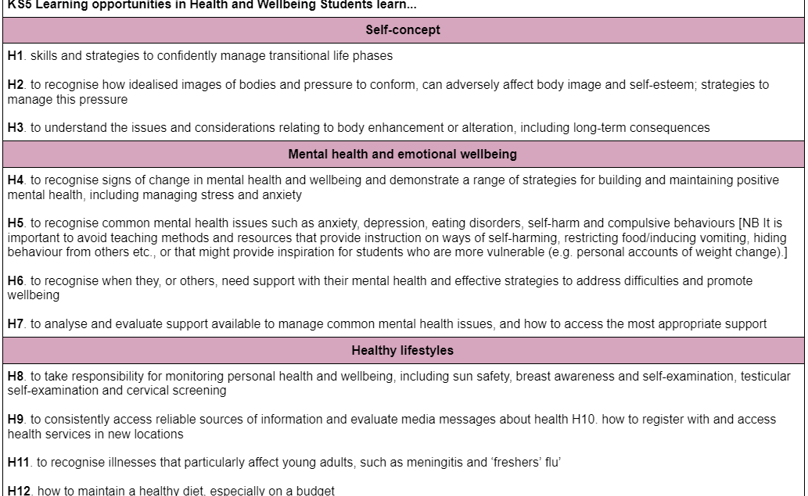

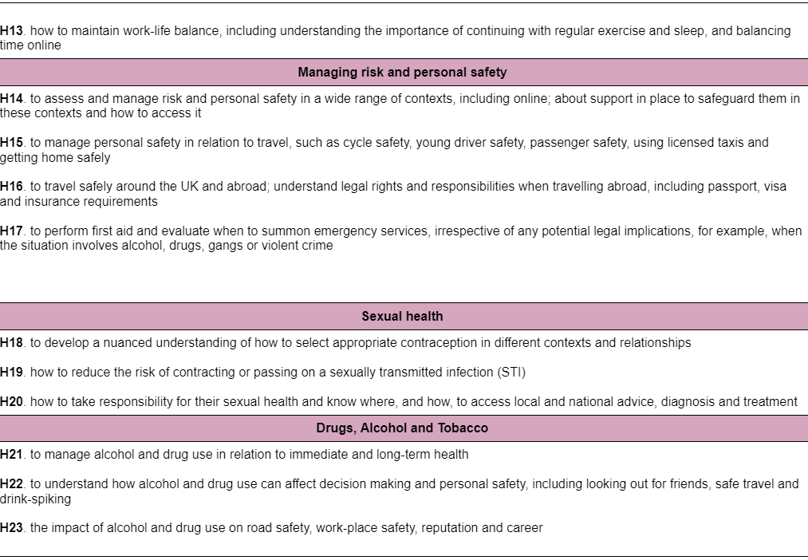

CORE THEME 2: RELATIONSHIPS
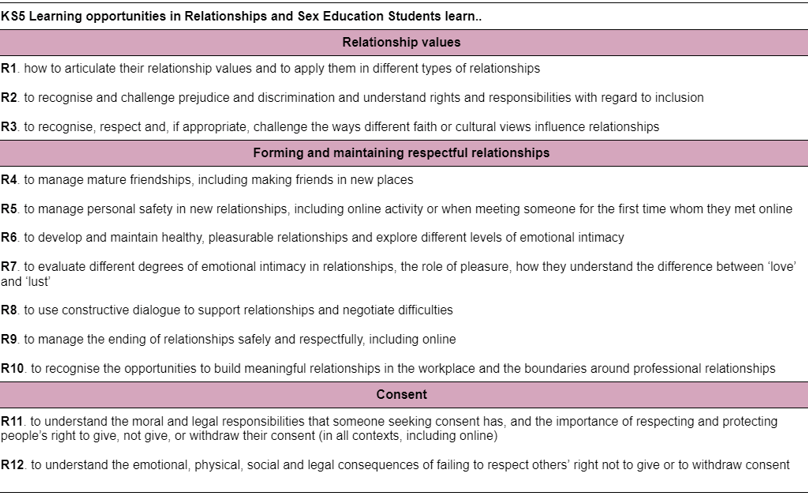

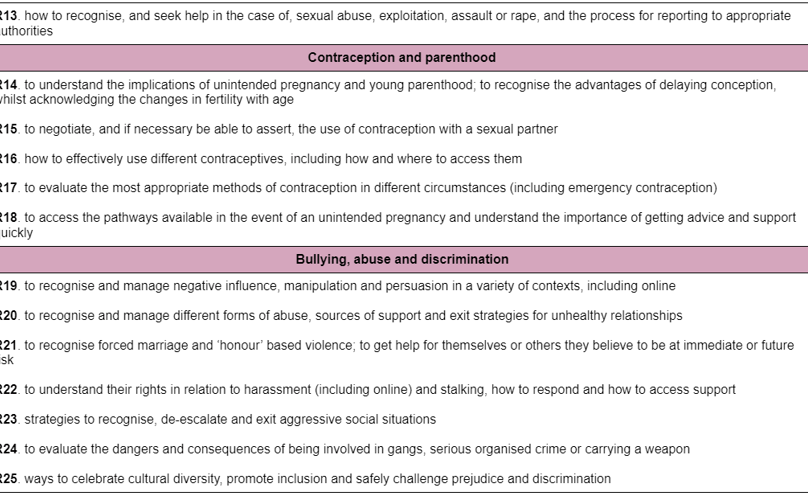

CORE THEME 3: LIVING IN THE WIDER WORLD
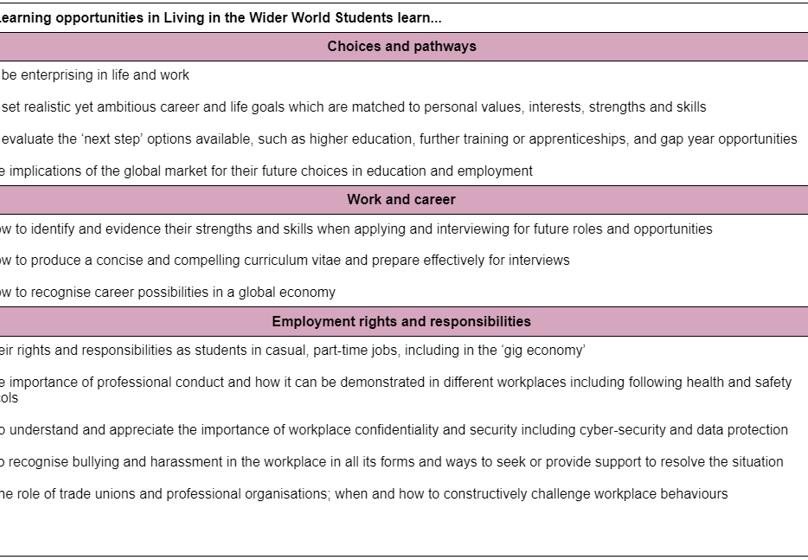

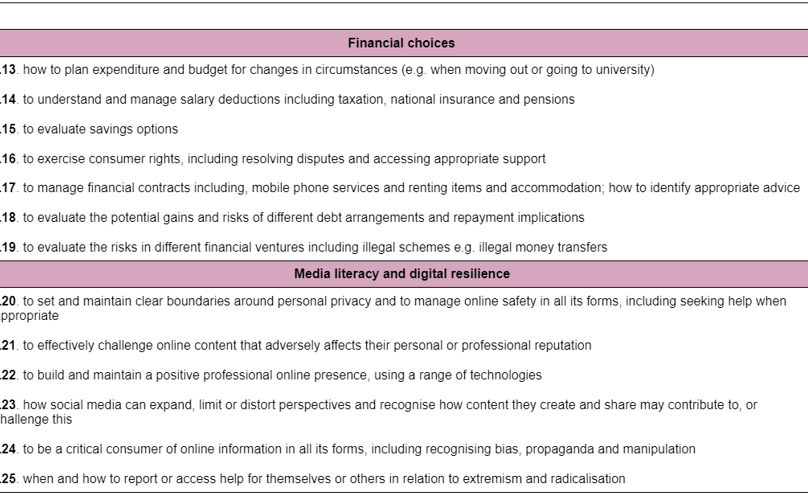

HOW DOES THE CURRICULUM LEARNING OPPORTUNITIES RELATE TO THE STATUTORY GUIDANCE?
The learning opportunities in the Programme of Study cover all of the content outlined in the Department for Education’s statutory Relationships, Sex and Health Education guidance, and go beyond this to integrate the statutory content within a complete and comprehensive PSHE education programme. The grids below set out where each aspect of the statutory guidance is covered by Programme of Study learning opportunities in key stages 3-4.
RELATIONSHIPS EDUCATION (SECONDARY)
Families F, Respectful Relationships including FriendshipsRR, Online and Media OM, Being Safe BS, Intermite & Sexual Relationships incl Sexual Health SH, Mental Wellbeing MW, Internet Safety & Harms IS, Physical Health & Fitness PH, Healthy Eating HE, Drugs Alcohol & Tobacco DAT, Health & Prevention HP, Basic First Aid BFA, Changing Adolescent Body CAB
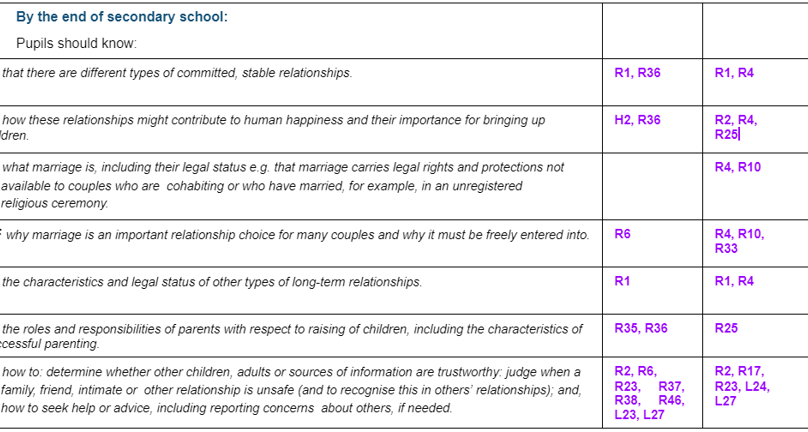

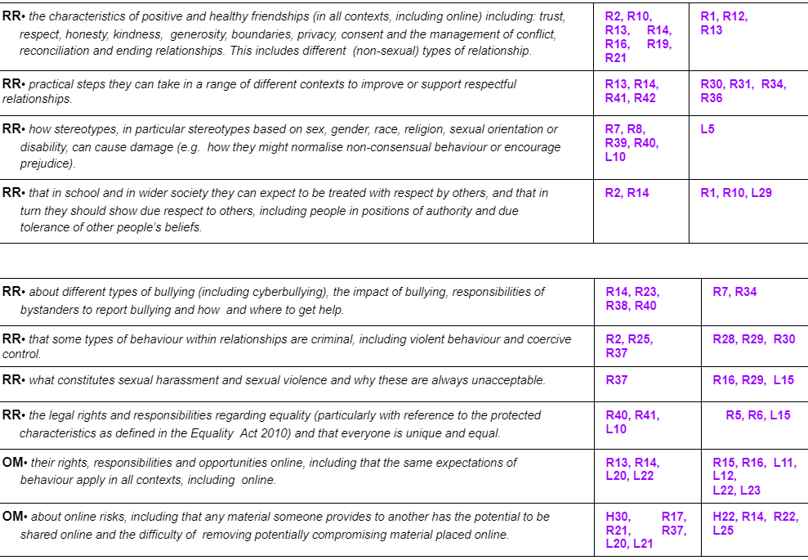

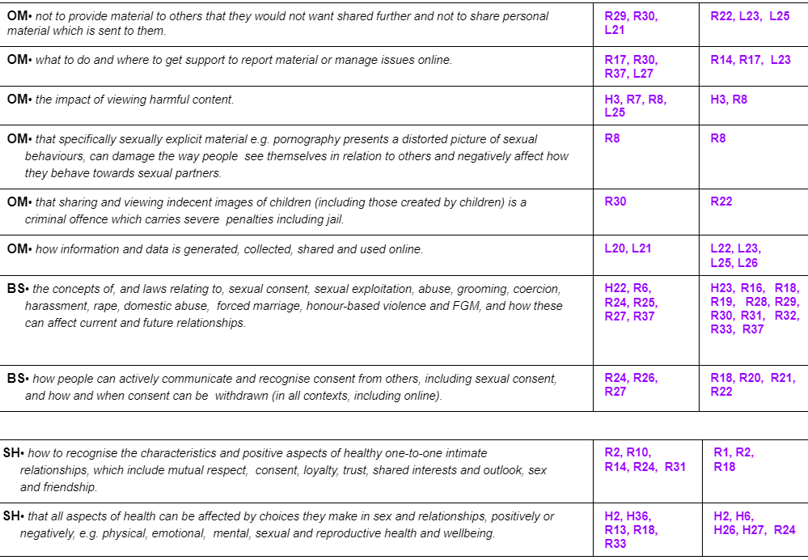

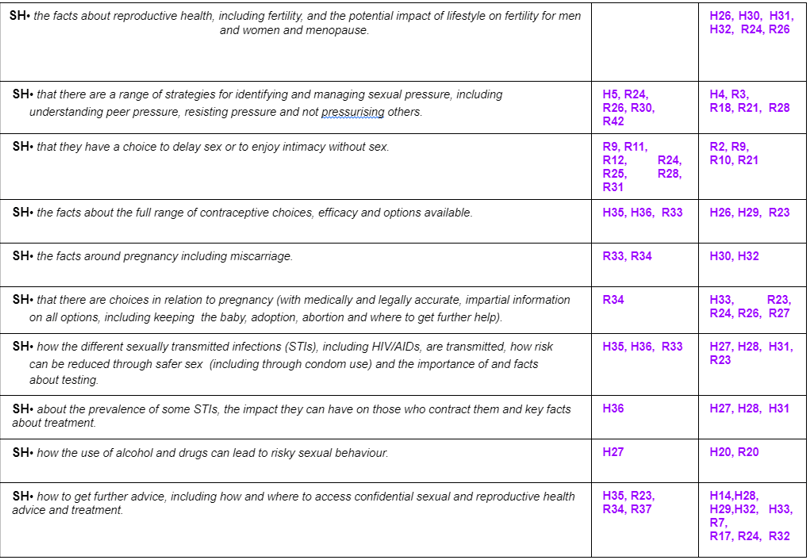

HEALTH EDUCATION (SECONDARY)
Families F, Respectful Relationships including FriendshipsRR, Online and Media OM, Being Safe BS, Intermite & Sexual Relationships incl Sexual Health SH, Mental Wellbeing MW, Internet Safety & Harms IS, Physical Health & Fitness PH, Healthy Eating HE, Drugs Alcohol & Tobacco DAT, Health & Prevention HP, Basic First Aid BFA, Changing Adolescent Body CAB
